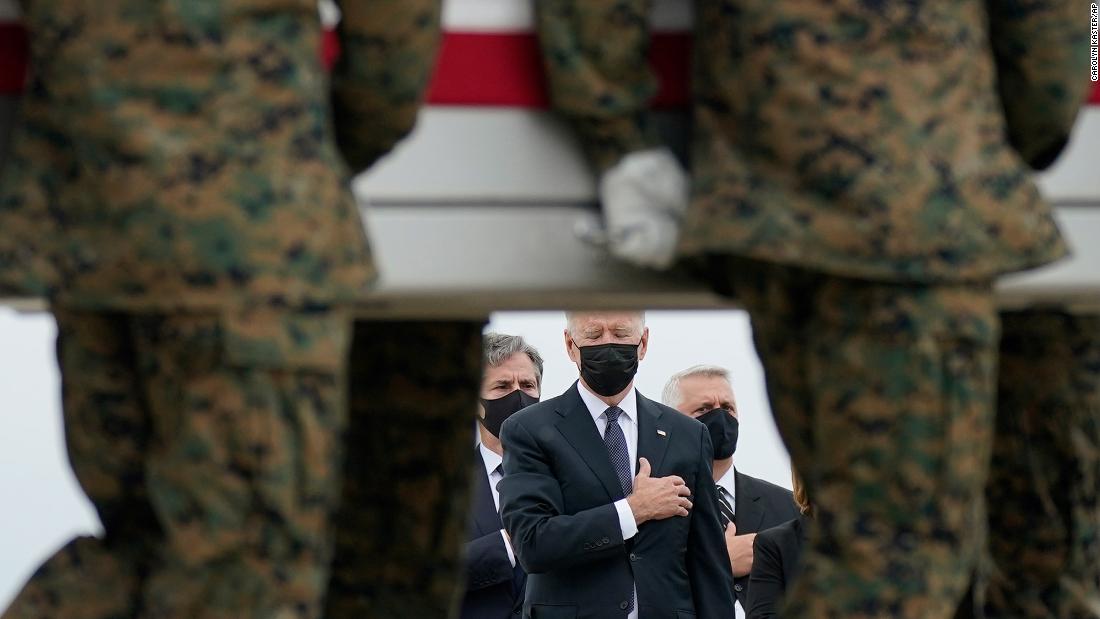Biden set to address the nation following the US withdrawal from Afghanistan
The US withdrawal, rocked by the Taliban’s unexpectedly swift takeover of Afghanistan’s capital, was chaotic.
Now, a day after leaving Secretary of State Antony Blinken and US Central Command Commander Gen. Kenneth “Frank” McKenzie to speak in the hours after the final military plane left the country, Biden will address the American people about his decision not to extend the US military presence in Afghanistan past the end of the month.
“The past 17 days have seen our troops execute the largest airlift in US history, evacuating over 120,000 US citizens, citizens of our allies, and Afghan allies of the United States. They have done it with unmatched courage, professionalism, and resolve,” the commander in chief said in a statement Monday evening. “Now, our 20-year military presence in Afghanistan has ended.”
On Tuesday morning, the President will first meet with his national security team for a briefing on Afghanistan in the Situation Room. He’ll then deliver remarks from the State Dining Room in the afternoon about ending the war, according to the White House.
“Their view was that ending our military mission was the best way to protect the lives of our troops, and secure the prospects of civilian departures for those who want to leave Afghanistan in the weeks and months ahead,” Biden added.
He thanked the final US forces serving in the country for executing the “dangerous retrograde from Afghanistan as scheduled,” with no further loss of American lives.
While the President delivered an address to announce the initiation of the US withdrawal from Afghanistan earlier this year, the Biden administration left Monday’s full withdrawal announcement to McKenzie.
The CENTCOM commander on Monday acknowledged that the US military “did not get everybody out that we wanted to get out.”
“But I think if we’d stayed another 10 days, we wouldn’t have gotten everybody out that we wanted to get out and there still would’ve been people who would’ve been disappointed with that. It’s a tough situation,” he added.
As of Monday, more than 122,000 people had been airlifted from Hamid Karzai International Airport in Kabul since July, Pentagon spokesman John Kirby told reporters, including 5,400 Americans.
And in the 24 hours leading up to Monday morning, 26 military C-17 aircraft lifted off from Kabul carrying 1,200 evacuees, according to Gen. Hank Taylor, the deputy director of the Joint Staff for Regional Operations. In total, 28 flights departed from Kabul airport in that 24-hour window, Taylor said.
A senior State Department official said the department believes there are fewer than 250 American citizens currently in Afghanistan — and Blinken said Monday that number may be closer to 100 — who may wish to leave, as US officials stressed a Taliban commitment to let Afghans leave the country after the US and allies left. The State Department official put the number of American citizens who have left the country through evacuation flights or other means closer to 6,000.
“We’re trying to determine exactly how many. We’re going through manifests and calling and texting through our lists,” Blinken said in remarks at the State Department.
The State Department no longer has any diplomats in Afghanistan and has moved its diplomatic mission in the country to Doha, Qatar, Blnken said. He added that the diminished US presence in Afghanistan is not necessarily the end of US commitment there.
The top US diplomat noted that there are residents of Afghanistan who have US passports who are trying to determine if they should leave.
“Our commitment to them, and to all Americans in Afghanistan, and everywhere in the world, continues,” Blinken said.
Biden has said he intends to hold the Taliban accountable to their commitment that those seeking to leave the country will be able to do so safely.
On Monday, White House officials said the President is continuing the hunt for terrorists in Afghanistan, telling his military commanders to “stop at nothing” to avenge the deaths of the 13 US service members at Kabul airport.
CNN’s Barbara Starr, Oren Liebermann, Jennifer Hansler, Nicole Gaouette and Jason Hoffman contributed to this report.
![]()


